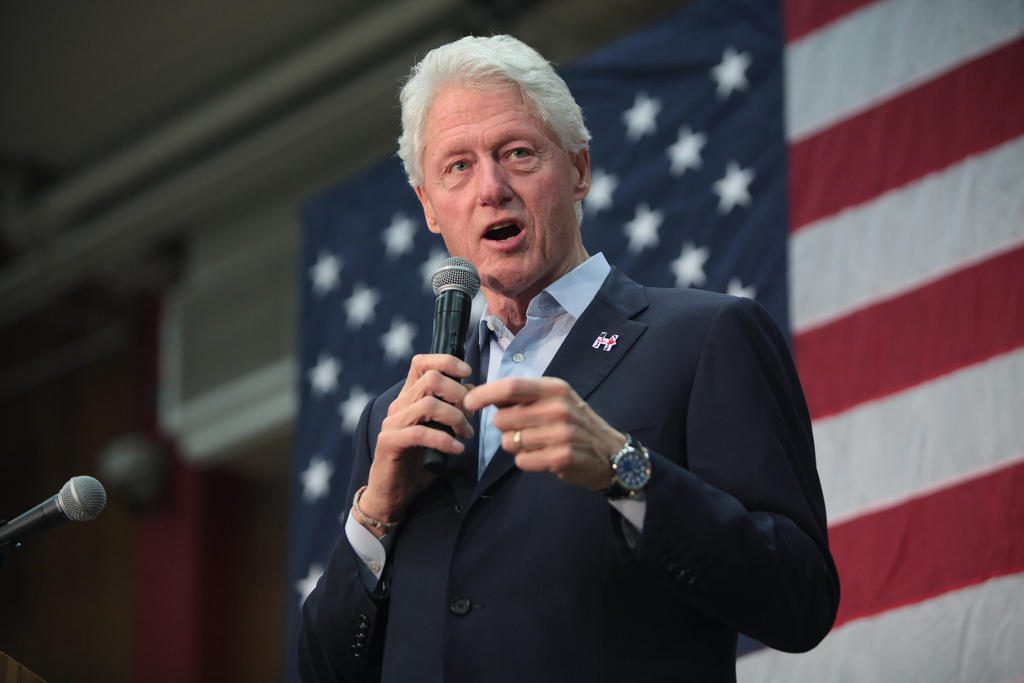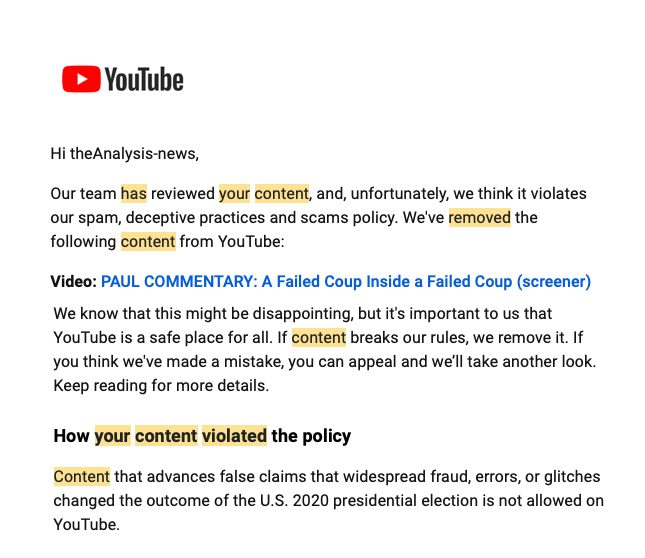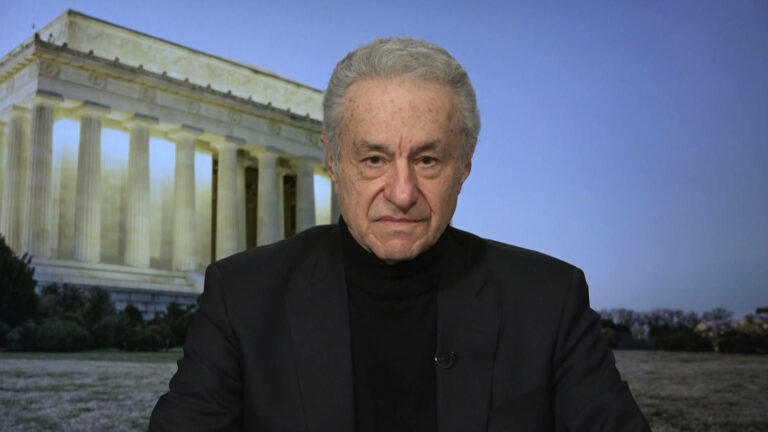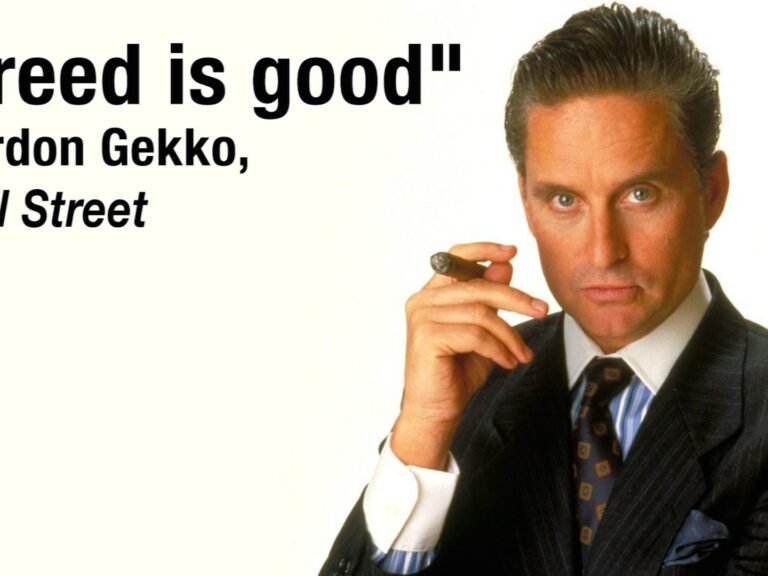On Reality Asserts Itself, Thomas Frank, author of “What’s the Matter with Kansas” and “Listen, Liberal”, tells host Paul Jay that the Democratic Party serves the professional class and the top 10% and no longer cares about the poor or working class. This episode was produced on September 5, 2017.
Paul Jay: Welcome to The Real News Network, and Reality Asserts Itself. I’m Paul Jay. If you watch The Real News with any regularity, you’ll know we haven’t been quite as obsessed with Russia’s supposed intervention in the American elections. According the leadership, or most of it, of the Democratic Party, it was Russian interference by leaking emails, Hillary Clinton emails and other, Podesta, to WikiLeaks, and that exposed something that shouldn’t have been exposed may have swung the election. At The Real News, we’ve more or less been saying we have no idea whether Russia did all of these things or not, nothing’s been made public that persuades us, the jury is back on that issue, but if they did get involved, the worst of what they did is, in our mind, expose something far worse, which was the attempts by the DNC to sabotage the Bernie Sanders campaign, which seems to me is a far more significant threat to American democracy. All that being said, the argument being given by the Democratic Party, or much of it, is that it was the Russians that swung the election to Trump. Well, is that true? Well, let’s discuss that with our guest. So this is the beginning of a Reality Asserts Itself series. We usually start with biographical information, but because all of this is kind of newsy, we’re going to start with a discussion of Russiagate, and I now am joined, very much happily on my part, by Thomas Frank. Thomas is a political analyst, historian, journalist, and columnist for the Guardian. He formerly wrote for Harper’s Magazine, Salon, and the Wall Street Journal, and founded The Baffler. Thomas has written several books, including ‘What’s the Matter With Kansas?’ and most recently, ‘Listen, Liberal.’ And Thomas told me off camera that it should’ve been an exclamation mark in the title, and we were both joking even if there were all kinds of exclamation marks, most of the liberals are unlikely to listen to all this.
Thomas Frank: Still wouldn’t do it, would it?
Paul Jay: No. Anyway, what do you make of the significance of whoever interfered and leaked all these emails, if it’s Russia or a whistleblower or whatever? What do you make of that as the rationale for why Hillary Clinton lost the election?
Thomas Frank: Well first let me say, it is so great to be here today, Paul. Here in beautiful downtown Baltimore.
Paul Jay: Thank you.
Thomas Frank: And what do I think of that assertion? I think it’s … I think the WikiLeaks emails were way down the list of factors that swung the election. I think that the election can be entirely explained by all the sort of usual things that we go to to explain American elections, these broad longterm shifts, and things that the candidates said and promises that were made, and after two terms of a Democratic presidency, there’s a million things that you can point to. In terms of blunders, if you talk about unforeseen blunders, wait, remember, first back up. The main impact that the WikiLeaks emails had, and they were covered in the American press, was Hillary Clinton’s speeches to Goldman Sachs. You remember, that was I believe almost the only item from those emails that made it into the press, and it was far overshadowed by Trump’s extremely vulgar comments. Remember, when he was on the Access Hollywood tape which came out at almost exactly the same time. So in terms of blunders, I mean, Trump’s blunders were so much bigger than Hillary’s, and just in terms of, as long as we’re just talking about mistakes that might’ve cost the Democrats the election, there’s so many other things that you have to mention other than that. I mean, the James Comey stuff where he appeared to reinstate the investigation against Hillary Clinton, which was so shocking. But also, you think of Barack Obama trying to get, remember this? Trying to get the Transpacific Partnership passed all the way through the election? That’s an incredible blunder while Hillary’s trying to distance herself from it, remember? And Trump is hitting her, hitting the Democrats for this every day, and here’s Obama saying, “No, we’re going to get it done. We’re going to get it done through Congress.” That really hurt, and another one, raising Obamacare premiums two weeks before election day. What were they thinking? Just ask yourself, I mean, you and I are old enough to remember Lyndon Johnson. Would Lyndon Johnson ever have made a move like that? No, it’s just like these are beginner’s mistakes. Or not beginner’s, it’s because they had such contempt for Trump. They didn’t think he had a chance, so Obama could take what was the most explosive issue in the election, trade deals, Trump was hitting the Democrats for trade deals at every speech all the time, and Obama could just disregard that. It’s not a threat, it’s not a problem. And here’s poor Hillary, remember, trying to backpedal backpedal backpedal, get out of this, saying “Oh, I’ve changed my mind about the Transpacific Partnership, I used to say it was the gold standard but now I know different,” and Obama just subverting her. It was a terrible blunder.
Paul Jay: And if-
Thomas Frank: But they don’t want to talk about any of that by the way, you know that right, of course, these are …
Paul Jay: If it was the emails and if it was Comey, then it doesn’t just affect the swing states.
Thomas Frank: Well there’s-
Paul Jay: Then she doesn’t win the popular vote.
Thomas Frank: Yeah, right, but there’s also, there’s a million things that … I think the Comey emails were a big factor.
Paul Jay: But they should’ve been a big factor everywhere.
Thomas Frank: Yeah, of course, but-
Paul Jay: But she still wins the popular vote.
Thomas Frank: But wait, as long as, it’s a silly, it’s a kind of rainy day way to talk about it. I don’t want to say it’s silly, but it’s a rainy day way to talk about politics. Because if you get to take away Hillary’s blunders or the terrible things, the accidents that happen to her, you get to take away Trump’s blunders too, and this man, oh my God. Just go down, remember all the mistakes this man made on the campaign trail in 2016? Attacking this group, insulting that group, going after the judge remember? Going after the beauty contest winner, oh my lord. On and on and on.
Paul Jay: I certainly didn’t predict Trump would win, and the morning of the election if you’d asked me, I would’ve said Clinton would win. But the first time I said to myself in a serious way, “Oh, she could lose this,” was the night before the election. They were in Philly and Obama’s onstage with her bragging about all the achievements of the administration. So little sense of the anguish so many people were feeling about their conditions, and all he’s doing is bragging about the economic achievements.
Thomas Frank: Yeah, and that’s the larger, the sort of motif of the Clinton campaign was complacency. This was a resume campaign, there was no … What was she offering to, I mean, the great swing electorate of this country, white working class voters, what is she offering these guys? And by the way everybody was saying, everyone knew what was coming. If Trump had a chance, that was the group that he was going to, that’s where his chances lay was with [crosstalk]
Paul Jay: And the swing states.
Thomas Frank: So what do you do about that? What do you do, what do you offer these guys? Well, there’s all sorts of things you could offer them. Hillary doesn’t bother. Instead, it’s about her qualifications. How she is the most qualified presidential candidate of all time, she’s running as a resume candidate. And the sort of unofficial slogan of the Democrats in this last go round was ‘America is already great.’ That’s just unbelievable.
Paul Jay: Well, that’s the whole point is that she ran in defense of the, and the continuer of the Obama legacy, but the Obama legacy saw one of the greatest increases in wealth inequality-
Thomas Frank: Inequality, yeah, inequality is totally rampant, totally out of control. By the way, I was at the Democratic convention. I went to both party conventions last year, and at the Democratic convention you had speakers who tried to make something of that, the growth in inequality. Elizabeth Warren talked about it, Bernie Sanders talked about it, the problem is they’re at the Democratic convention, and half of the speakers are from the administration, from the Obama administration. You can’t really blame this on … They were in a terrible spot, because that’s sort of what Democrats are very comfortable talking about, inequality, but they can’t do it when they’ve been sitting in the White House for eight years.
Paul Jay: I think one of the things you say in your book, and we talked off camera ahead of time, it’s not just they made mistakes and it’s not just they don’t learn and observe but they have a vested interest, and they represent a section of the elite, and maybe they should be better liars but they’re a little closer to what they really think-
Thomas Frank: But they really and truly don’t care. Yeah, I think that’s about … I don’t want to be too, I don’t want to apply that with too broad a brush, because you and I both know there’s plenty of Democrats who do care and there’s a lot of good Democrats out there, and I hope that we’ll see some shift in the Democratic party. By the way, a lot of Democrats historically that I’m fond of, I like Franklin Roosevelt, I like Harry Truman, Lyndon Johnson, these are good … I mean, these people with terrible flaws but these are guys who would’ve known what to do about the current economic situation.
Paul Jay: We are going to talk a little bit about this later, because each one of these presidents you just mentioned have some pretty horrible things on their record.
Thomas Frank: Of course. Vietnam War, of course, but wait-
Paul Jay: And dropping nuclear bombs on people.
Thomas Frank: Yeah, but the current, the faction that is currently in charge of the Democratic party, this is by and large a very contented group of people. So the thesis of ‘Listen, Liberal,’ what I write about in ‘Listen, Liberal’ is how the Democratic party changed from being a party that really cared about blue collar workers, working class people, to being a party that cares about a very different group.
Paul Jay: Did it actually care when, even Roosevelt, when he originally ran he certainly wasn’t running on a stimulus plan, he wasn’t running on a big jobs program.
Thomas Frank: Did they genuinely care?
Paul Jay: Let me just add one point to it. Are they simply more farsighted when it comes to systemic solutions? Like, Roosevelt knew that if you want to keep any form of modern Democratic capitalism-
Thomas Frank: Yeah, it has to be reformed, yes.
Paul Jay: -you need to have a jobs program and such or you’re going to be dealing with some kind of fascism in the United States.
Thomas Frank: Yeah, that’s right, no, that’s exactly right. But towards the sort of end of the New Deal era, like in the 1960s, labor unions were very powerful within the Democratic party, members of Congress often came from a blue collar background, came up through organized labor, that sort of thing was fairly common in those days. This is not to say that they were ever a perfect party or anything like that, but there was, there has been a real shift. Not a cosmetic shift, but a real shift on-
Paul Jay: Doesn’t that actually begin with Truman?
Thomas Frank: With Truman?
Paul Jay: Yeah, like Vice President Wallace, Roosevelt’s vice president-
Thomas Frank: Yeah no, you’re right. There’s been fights-
Paul Jay: A real progressive, and then you had kind of a coup against Wallace, the unions want Wallace to become the vice presidential nominee, and in ’45 that’s kind of a coup within the party and they dump Wallace and bring in Truman.
Thomas Frank: And bring in Truman, I know. But that’s, I consider that that stuff was too far outside of the focus of ‘Listen, Liberal,’ I start in the late 1960s, which is, there was an enormous change in the Democratic party. A lot of it for the better, this is in the aftermath of the Vietnam war when the Democratic party decided to sit down and reform itself, and they basically decided to remove organized labor from its structural position within the Democratic party. This is the famous McGovern Commission in the early 1970s. Now, some of the things they did were very good and very healthy, and in their defense … By the way, once they do this, once a party of the left, which is unfortunately what the Democrats are in our system, once a party of the left decides that it’s no longer going to be a voice of working class people and instead is going to be a voice of a different group, namely affluent white collar professionals which is what they deliberately chose in the early 1970s. They chose to make this transition. When that happens, things like the inequality, the situation that we’re in today are inevitable. When the left party in your system has decided that they don’t really care about the fate of working class people, what we have seen come to pass is inevitable. Now, in their defense, no one in 1971 would’ve seen that coming. I mean, America was probably at its most equal state ever, like the high water mark of social equality. Or I should say economic equality, in this country where you had, very famously back in those days, blue collar people living next door to white collar people, both live in ranch houses in the suburbs or whatever, and the difference would mainly be a matter of taste. Commentators, like sociological commentators used to write about this all the time. Like, “This guy drinks Budweiser, this guy drinks martinis, this guy drives a Chevy, this guy drives a Buick,” but they earned the same amount. And that’s who we were in this country, not all-
Paul Jay: The higher paid, the higher stratums of mostly unionized workers were making similar money to some professionals.
Thomas Frank: White collar, exactly. Yeah. And that was-
Paul Jay: And to a large extent, because they were getting kind of bought off with the-
Thomas Frank: Well they were paid really well-
Paul Jay: Well yeah, but they were getting that set share of the plunder of the world, because they-
Thomas Frank: Oh of course, oh no, those were. You were talking about the very large picture, yes, absolutely. And they have a lot to answer for, too. But all I’m getting at here is that this was the case in this country and that has completely disappeared. And in fact, I’m in my fifties now, but I grew up in that world where, I’m from Kansas City. If you have a parade in Kansas City, organized labor had a float in the parade. If you had a blue ribbon commission to decide some issue, organized labor had a seat at the table. It was just that’s who were as a society that working class people were represented, and that’s gone. And I describe this to younger people, and they can’t imagine that America was like this, but it was not just that America was like this. This was the cliché of you were who, you know?
Paul Jay: And isn’t part of what happened in the Democratic party is that the leadership of many, not all but many, of the big unions, because they’re having such a comfortable life and the leaders of the unions are not living and getting paid like professionals, they’re getting paid like CEOs. They’re getting, you know.
Thomas Frank: That’s right. CEOs in the ’70s, it’s a very different world now.
Paul Jay: Yeah, but big salaries and $40 steaks at lunch and so on, that they ceded. They said okay to the elites, they said okay to Wall Street. “You can run the Democratic party, you just make sure that us big unions kind of get what we need in a very narrow way.”
Thomas Frank: Oh that’s right, I think that might be the case. I mean, some unions were always better than others. United Auto Workers for example, but they were very angry when this happened to them in the ’70s, when they basically lost their Democratic party, they were very upset about it.
Paul Jay: Part of the critique of, including the auto workers, is that they had this wonderful healthcare plan for themselves but they did next to nothing to lobby for a universal healthcare plan for the country. Later, they get screwed.
Thomas Frank: Yes. Look, all of these are, these are all true and correct objections, but the larger picture thing is they get removed from their position of strength in the Democratic party, the Democratic party then becomes through the 1970s and the ’80s, becomes a very different beast and becomes a vehicle for the interests of affluent white collar professionals. And as we all know, labor by and large still endorses Democratic candidates, funds Democratic candidates, and the Democrats have lots of other groups who are part of the coalition as well. We all know that. Minorities, women, the young, on and on and on. Many many many groups that vote that are reliably Democratic. But the group that comes first, and the group whose interests always prevail in Democratic circles, is professionals. And by the way, this is not a secret, this is not something that I made up, this is not something we have to read between the lines. They’re open about this. They talk about this all the time, the Democratic party. You read their-
Paul Jay: And in your book you call this class the meritocracy.
Thomas Frank: Yeah, this is … Well, that’s their philosophy, and that’s the philosophy that the Democratic party has by and large embraced, and you see it in the Hillary Clinton campaign in a sort of staggering way. Well, you see it in Hillary Clinton’s career where Hillary Clinton, and by the way, and I don’t hold this against her, I admire Hillary Clinton in all sorts of ways, but she’s like her husband and like Barack Obama, she comes from a humble background and is plucked out of it by a fancy education, by a fancy school. In her case, Wellesley College. In her husband’s case, Georgetown. Barack Obama was at Harvard. Was it Harvard? It was Columbia and then Harvard for grad school.
Paul Jay: Yeah, and he heads up the Harvard Law Review, yeah.
Thomas Frank: Yes, right, right. But there’s, it’s always the same trajectory with these people where their success in life comes through education, and comes through the opportunities that education affords them. And so Hillary goes to Yale law school, Hillary becomes this super lawyer sort of back in Little Rock, and they used to call her whatever it was, the best lawyer west of whatever river Little Rock is west of. I don’t even remember, it might be the Mississippi, I forget. But that’s her career, is defined by her academic excellence and her achievement as a professional. And that’s really who she cares about, and that’s who the Democratic party cares about. And you can see this, and what I do in ‘Listen, Liberal’ is I point out all the ways that this manifests itself, that this meritocratic worldview that a guy like Barack Obama really embraces at his core, that really is who he is, you know. He really believes that the talented should rule and that the talented can figure out, and-
Paul Jay: And then these guys say to the section of billionaires willing to listen to them, and they say to them, “We will manage the system for you, and it’ll be good for you and it’ll be good for us, and we know how to talk to the working class so we’ll make sure that they don’t become a problem.”
Thomas Frank: Yes, and it’s … So what you see in America basically in the last 20 or 30 years is both parties speak to different segments of the wealthy. The Republicans have the 1%, the people with inherited wealth, the people who are really way up there. Koch brothers, Walton family, that kind of thing. The Democrats speak to the top 10%. Your affluent suburban professionals, people with advanced degrees, people who live in the nice suburbs. And these are people that I live among, I am one of these people.
Paul Jay: Well they get some of the 1%ers, they get some of them. They get some of the hedge fund guys and they get Silicon Valley.
Thomas Frank: But you have this situation now where it’s gone so far that … Did you know that Hillary out-raised Donald Trump two to one in this last go round? And you look at the really affluent, like the affluent college towns, the affluent suburbs, Hillary won them. Hillary won Orange County. Am I right about that, or did I imagine that in a dream or something? It just …
Paul Jay: I’m not sure.
Thomas Frank: But where Hillary Clinton was beating Donald Trump in all of these sort of corners of American wealth. Donald Trump, the billionaire.
Paul Jay: And my understanding is Trump had very little billionaire money behind him other than Sheldon Adelson.
Thomas Frank: A handful of the usual suspects.
Paul Jay: It wasn’t till, well, in the primaries he had only Sheldon Adelson and then after the primaries he gets Robert Mercer, who you should watch our documentary about Robert Mercer, The Bizarre Right Wing Billionaire That Backed Bannon and Trump, because he played a key role in this, but he didn’t have the normal billionaires, including the Koch brothers.
Thomas Frank: They were not excited about Trump. So Hillary out-raised and outspent Trump two to one. I remember I went to Florida the week before and actually went to Palm Beach right down the street from Trump’s house, and I was in Palm Beach … You know Florida, the ultimate swing state, the week before the election. I was writing a story that I assume we’ll talk about later, a story for the Guardian about … Well, we’ll come to this later. But I was watching TV of course, watching the news, and it was wall to wall Hillary commercials. Hillary TV commercials constantly, no Trump commercials. I didn’t see any Trump TV commercials, but then you get in the car and drive out into the countryside and there’s Trump billboards everywhere you go. It was a really interesting moment where Trump basically, in all sorts of ways, kind of flipped the equation on the Democrats, and did so well in all of these blue collar counties, and with a lot of these blue collar voters who really, as I’ve always said, have no business voting for a guy like that and are spectacularly ill-served by Republican economic policy.
Paul Jay: Okay, in the next segment of our interview, we’re going to continue our discussion and dig a little further into what sections of the working class voted for Trump and why. Thomas has written quite a bit about this, including his book, what is it again, ‘What’s the Matter with Kansas?’ Well, what’s the matter with the American working class? We’re going to talk about that in the next segment of Reality Asserts Itself with Thomas Frank on The Real News Network.
Podcast: Play in new window | Download | Embed
Subscribe Apple Podcasts | Spotify | Android | iHeartRadio | Blubrry | TuneIn | Deezer | RSS
Never miss another story
Subscribe to theAnalysis.news – Newsletter
Thomas Carr Frank is an American political analyst, historian, and journalist. He co-founded and edited The Baffler magazine. Frank is the author of the books What’s the Matter with Kansas? and Listen, Liberal, among others. From 2008 to 2010 he wrote “The Tilting Yard”, a column in The Wall Street Journal.















